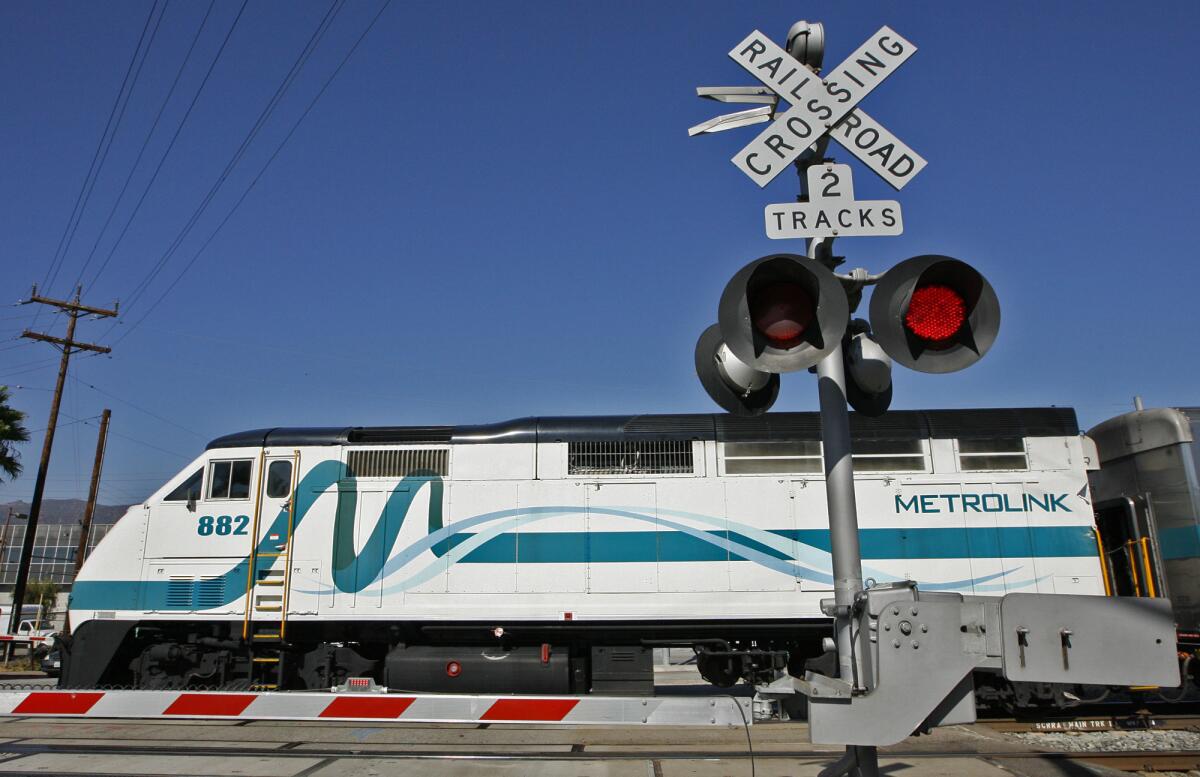Burbank to establish public pay-to-park lots at downtown Metrolink station

- Share via
The parking lots for the downtown Burbank Metrolink station will soon be the first city-owned pay-to-park sites in the city.
The City Council voted 4-0 (Councilwoman Emily Gabel-Luddy was absent) on Feb. 25 to approve a parking management plan for the five lots that serve the Metrolink station and to direct staff to start looking for a parking operator to oversee operations at the lots.
David Kriske, assistant community development director of transportation for Burbank, told the council there are currently a combined 470 parking spaces across five lots — four of the lots are located along Front Street and the fifth is near 123 W. Olive Ave. — that are not currently managed.
The only enforceable restriction at those lots is the city’s 72-hour rule, which bans a vehicle from being parked in the same spot on a city street or public parking lot for more than 72 hours at a time.
“We have a sign [at the parking lots] that says it’s for transit-use only, but it’s a fake sign,” Kriske said. “We don’t actually have the ability to enforce that.”
The new parking management plan is geared to regulate parking in a way that ensures parking spaces for transit users — Metrolink, Amtrak, Metro bus and BurbankBus — as well as to allow nontransit users to park at the facility as long as it doesn’t impact people trying to catch a train or bus.
Additionally, Kriske said the plan will attempt to crack down on those who use the parking lots to store their vehicles for long periods of time or even abandon a car outright, as well as those who illegally camp at the facilities.
“We know that at the station it’s used for long-term storage, and we get calls for abandoned cars all the time,” Kriske said. “We want to discourage some of that abuse.”
Vice Mayor Bob Frutos expressed concerned about the lot on Olive, which is next to the Burbank Tournament of Roses’ float barn and is often used by the organization and its volunteers throughout the year.
Kriske said city staff will look into providing the organization with passes or a validation system to allow volunteers to continue to use the site without being charged.
Under the parking management plan, the city will hire a private operator to oversee daily operations and enforce the parking rules at the five lots.
The city will be in charge of setting the rates and ensuring the operator is implementing the parking plan.
The lots themselves will be gateless and will use license plate recognition programs — like those found in Pasadena or West Hollywood — to identify which vehicles have paid for parking.
People who opt to purchase their parking pass on a daily basis will have to register their vehicle’s license plate number at a kiosk at the lot or through a smartphone app. Additionally, those looking to purchase a monthly pass will be able to register their vehicle’s plate number online.
Kriske said the parking management plan will include a tiered pricing system that will provide discounted parking for transit users.
Burbank is currently working with Metrolink to develop a system that will allow commuters to use their Metrolink ticket to verify that they are transit users.
If this is accomplished, Burbank would be the first city to partner with Metrolink on such a program, Kriske said.
“Metro is doing this right now at Metro Rail for you to buy a pass at a Metro Rail station,” Kriske said. “We want to mimic that in the long term with Metrolink, and they want to be our partner.”
Pricing has yet to be established for the lots but will be set to hit a specific parking occupancy for each lot, Kriske said.
The parking management plan is aiming to achieve between 65% and 85% occupancy at the lots at all times, and rather than having a set-in-stone price, Kriske said the plan will allow the city to adjust the rates every three to six months to either encourage to discourage parking at the facilities.
“We’re not proposing to set pricing to maximize revenue,” Kriske said.
The parking lot operator will be paid with the revenue generated at the lots. However, any additional revenue will be reinvested into the downtown Metrolink station.
Kriske said the city pays on average more than $300,000 in maintenance costs at the downtown station.
On the other hand, Burbank will pay out of pocket — by way of local return funds — if the parking lots do not generate enough revenue to pay the operator.
The city hopes to have the parking management plan up and running by September.
